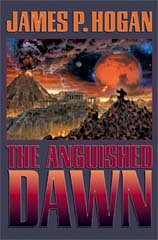
By the second half of the twenty-first century, Earth had become comfortable and complacent. The military threats that had once spurred technological development were no longer credible, the threat of major war having given way to local counterinsurgency actions and suppression of resistance to what was tending ever more toward the establishment of a global state. With financial institutions finding safe and secure profits close to home and having little incentive to put capital into risky, far-off ventures, the space initiative had not lived up to its earlier vision and promise. Institutionalized science echoed the cultural message of stability and security by reaffirming its doctrine of a universe shaped by gradual, uneventful, evolutionary change under the direction of laws that were immutable and understood.
Not everyone, however, found the notion of material affluence and comfort as the sole aim of life to be a very satisfying philosophy, or accepted the officially promulgated schools of thinking that led to such a conclusion. Landen Keene was one of the restless few who felt that humanity and its civilization were destined for better things. A Texas-based nuclear propulsion engineer who had been battling against complacency and inertia for years to champion meaningful expansion into space, he became a natural ally of the breakaway "Kronian" migrants, who established an advanced technological outpost culture among Saturn's moons to live by their own moneyless value system based on individual merit and cooperative enterprise.
Freed from institutional control and commercial interests, and flourishing at last as the open pursuit of knowledge for its own ends, science under the Kronians opened up new realms of physics and practical application whose pursuit had languished on Earth, and explored academic questions that had been impermissible under the intolerant dogmas that had come to dominate Earth's scientific thinking. What brought about changes in the terrestrial environment that would make the existence of dinosaurs impossible in modern times? Why did conventional Ice-Age chronology have to be wrong? Who were the people who had developed writing and elaborate artifacts long before civilizations were supposed to have existed, and how could they have lived beneath the alien sky that their records depicted?
Finally, the Kronians sent a delegation to Earth with evidence of violent upheavals across the Solar System that had occurred into the times of recorded human history. Keene and others joined the Kronians in warning that such events could happen again, and the human race would be vulnerable for as long as it remained concentrated in one place. But the plea was rejected since it didn't fit with prevailing theory, and dismissed as a political ploy to divert Earth's resources to Kronia. Its proponents were ridiculed, their arguments misrepresented and distorted . . . until, with the ejection of the white-hot protoplanet Athena from Jupiter and the perturbing of its Sun-grazing orbit onto a course sending it toward Earth, a catastrophe that had come close to wiping out the human race once before was about to happen again.
With traditional authority discredited, Keene found himself suddenly elevated to being a principal governmental advisor on the situation. As conditions worsened worldwide with Athena's approach, he was sent to California as part of a team helping to organize the nation's crash program of emergency measures and evacuations. But the planetwide cataclysm of meteorite and climatic storms, flooding and conflagration, gravitational and electrical upheaval, were on a scale that dwarfed anything that had been imagined, overwhelming all attempts to cope. In the final days, with the world as they had known it ending around them, Keene and a small group of companions that fate had thrown together embarked on a desperate cross-continental journey to a site in Mexico, where a shuttle remained that could get them off the surface.
From orbit they watched Earth's final destruction as it gyrated in a final close pass with Athena before Athena detached to careen onward toward the outer Solar System. For days they drifted in space, not knowing if anyone else was left alive anywhere, but were finally picked up by the vessel that had brought the Kronian delegation to Earth and which had remained in the vicinity, rescuing survivors who had managed to escape from the surface.
And so they returned with the Kronians to begin new lives in the unique culture that had come to exist among Saturn's moons, now the sole, slender remnant of human civilization—and for all anyone knew, the last refuge of surviving humanity anywhere.
Meanwhile, Athena continued to wreak havoc and disruption among the bodies of the Solar System.